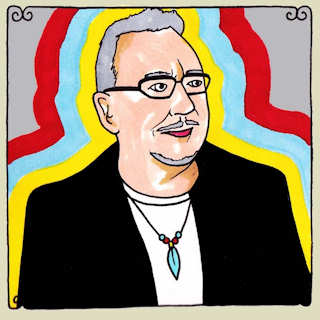- Welcome to Daytrotter
- Don’t Bring Me Down
- When I Was Young/Inside Looking Out/It’s My Life
The smile on Brendan Benson’s face throughout this session with The Animals’ legendary lead singer Eric Burdon said it all. He had a look – facing his wife, who was standing over on the other side of the piano at Good Danny’s in Austin, Texas – that suggested, “I can’t believe this is fucking happening right now.” Prior to this day – or this trip to South By Southwest – I’m not sure how much Benson had been around Burdon, but it seemed like this was a special moment for him personally, much like it was for anyone who was in the room as this was cut. Especially on “Don’t Bring Me Down,” with Benson frantically mouthing for a tambourine mid-song – knowing exactly where he wanted to be playing it – there was a wild elation working its way through the place.
All of this was justifiably so as Burdon and The Animals are as important to blues and the way it morphed into that southern rock and roll sound, as the Rolling Stones are, tapping into similar ideas and vibes at the exact same time, with the Animals and Burdon creating some of the more brooding and electrifying moments ever known by any genre. Burdon seemed to then — and obviously still does — convey the feeling of being an outsider, of being persecuted/worked over, that was rooted to a large degree in the atmosphere of segregated, pre-Lyndon Johnson southern America. There was a sensation of deception and of corruption that snaked through Animals songs, given the fangs that were so significant by the agitated Burdon.
His terrific autobiography, “I Used To Be An Animal, But I’m Alright Now,” begins with Burdon, noting in the prelude, “‘The experience is the important thing,’ a friend of mine once said. That’s all I ever did, go out and grab at the experience. As one of the first blues I heard points out, ‘This story ain’t got no moral, this story ain’t got no end, this story only goes to show, there ain’t no damn good in man.'” It’s a helluva way to kick off your life story, but much of his music is steeped with these nods toward sinful behavior and dark places. In the book, he describes the band’s first trip to the south – something they’d been looking extremely forward to.
While in Mississippi, Tennessee and other places in those parts, they met Otis Redding in the same Lorraine Hotel where Martin Luther King Jr. was shot and killed, they encountered and cussed out the Ku Klux Klan and they partied with governors and politicians in dry counties who had police officers personally deliver them the strongest and best white lightning moonshine anyone had ever tasted. Being down there and seeing the way life was, the way some people acted and the ways that others were forced to behave affected him greatly and while he already was keyed up and tuned to spirituals and the blues, he understood it better. He was angrier about it. He was more depressed about it. He recognized that the evil in people always found a way to get out and roam about. He sings about it, we would argue, better than most men ever have.
